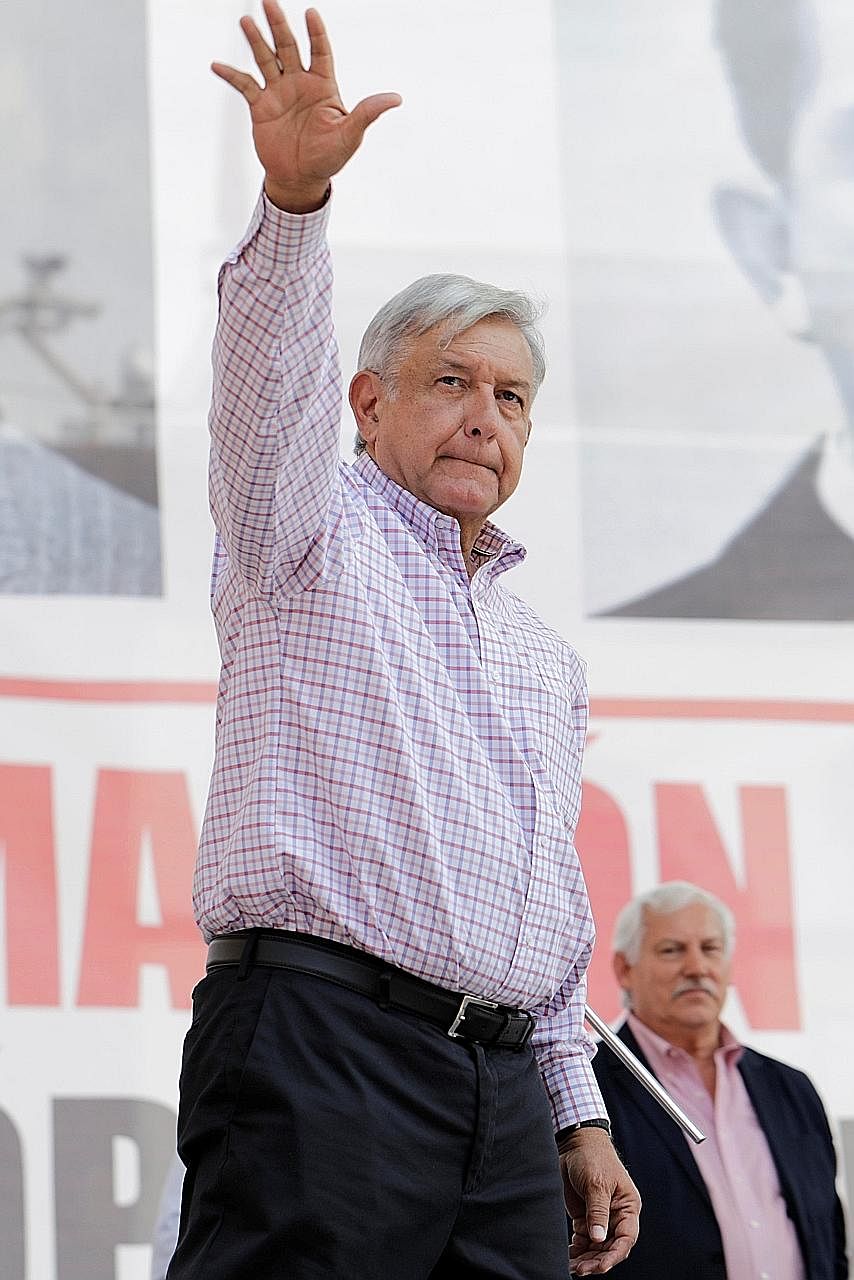Mr Andres Manuel Lopez Obrador, who will be sworn in later today as Mexico's new President, comes into office with a solid political mandate, and a huge amount of public goodwill.
He ran unsuccessfully in two previous Mexican presidential elections, and proclaimed himself the "Legitimate President" after one of them, alleging that his electoral loss was due to fraud. But he crushed his opponents on his third attempt in the presidential elections in July, and enjoys the support of over two-thirds of ordinary Mexicans, more than double the 26 per cent for outgoing President Enrique Pena Neto.
The 65-year-old Mr Lopez Obrador, a left-winger who is universally known by his acronym of AMLO, also enjoys a solid majority in both chambers of the Mexican Congress. His political movement, Morena, also won five out of nine governorships in the July polls. And if this was not enough, he is also inheriting a healthy Mexican economy.
Yet despite all these good indicators, international investors who piled into Mexico over the past few decades, regarding the country as one of the safest emerging markets with a record number of trade deals, world-class technocrats and prudent finances, are now deeply apprehensive about what lies ahead.
And the Mexican peso, the second-most-traded among emerging market currencies after China's yuan, is already one of the sector's worst-performing units.
The fear is that Mr Lopez Obrador, who ran a populist campaign advocating a vast social "revolution" and who once famously said that most of Mexico's government institutions could "go to hell", may return to the authoritarian policies the country experienced during the 1960s and 1970s, with disastrous results similar to those in Venezuela today.

Mr Lopez Obrador spent most of his long presidential transition period trying to reassure business that, despite his fiery rhetoric, he will be a responsible leader. From the sidelines, he did little to interfere in the delicate renegotiations of a free trade accord with the US and Canada, a centrepiece of Mexico's economic revival. He also promised to keep Mexico's finances in check, and appointed a respected economist as finance minister.
But, over the past few weeks, Mr Lopez Obrador suddenly changed tack, sending international investors into a tailspin. Mexico's new President claims to be a great believer in "people's vote" by which he means popular consultations in which voters are asked to have their say on public policies and projects.
In reality, most of these "referendums" are organised by Morena and voting booths are usually installed in areas where the movement is already doing well.
But the outcome of these informal consultations has been hailed as a higher form of democracy, and the new President's spokesman, Mr Jesus Ramirez, has warned investors that, from now on, they "would have to understand the balance" between the views expressed in such popular consultations and the government's attitude to business.
The incoming administration has already used a two-to-one majority vote in a "people's vote" to scrap a US$13 billion (S$17.8 billion) project for Mexico City's new airport. The cancellation not only eliminated Mexico's largest public project in spite of the fact that it's a third of the way to completion, but also served as a reminder for investors of the real Lopez Obrador; during his opposition years, the new President has often branded the airport project as "riddled with corruption", without offering any evidence.
The worry for investors is that the new Mexican administration may push even more radical proposals, such as the construction of a mammoth oil refinery plant in Mr Lopez Obrador's own home state of Tabasco - a traditional method of enhancing patronage - as well as a doubling of the minimum wage and pension payments, measures which are certain to break Mexico's finances.
Mr Lopez Obrador's first priority in office is to regain the confidence of the investment community, which is now on edge. And he does not have too much time to do it: he has just two weeks before he must unveil a new budget.

